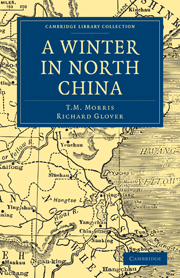Book contents
- Frontmatter
- INTRODUCTION
- AUTHOR'S PREFACE
- MAP OF THAT PART OF CHINA VISITED BY DR. GLOVER AND THE REV. T. M. MORRIS.
- Contents
- CHAPTER I FROM SAN FRANCISCO TO YOKOHAMA
- CHAPTER II CHEFOO AND TIEN-TSIN
- CHAPTER III FROM TIEN-TSIN TO TSING-CHOW-FU
- CHAPTER IV TSING-CHOW-FU
- CHAPTER V CHOW-PING
- CHAPTER VI CHI-NAN-FU
- CHAPTER VII THE GREAT PLAIN OF CHINA
- CHAPTER VIII T'AI-YUEN-FU
- CHAPTER IX PEKING
- CHAPTER X AN INTERVIEW WITH LI-HUNG-CHANG
- CHAPTER XI SHANGHAI
- CHAPTER XII HANKOW, HONG-KONG, AND CANTON
- CHAPTER XIII THE RELIGIONS OF CHINA
- CHAPTER XIV FUNG-SHUI
- CHAPTER XV MISSIONARY WORK AND METHODS IN CHINA
- APPENDIX
CHAPTER XIV - FUNG-SHUI
Published online by Cambridge University Press: 05 August 2011
- Frontmatter
- INTRODUCTION
- AUTHOR'S PREFACE
- MAP OF THAT PART OF CHINA VISITED BY DR. GLOVER AND THE REV. T. M. MORRIS.
- Contents
- CHAPTER I FROM SAN FRANCISCO TO YOKOHAMA
- CHAPTER II CHEFOO AND TIEN-TSIN
- CHAPTER III FROM TIEN-TSIN TO TSING-CHOW-FU
- CHAPTER IV TSING-CHOW-FU
- CHAPTER V CHOW-PING
- CHAPTER VI CHI-NAN-FU
- CHAPTER VII THE GREAT PLAIN OF CHINA
- CHAPTER VIII T'AI-YUEN-FU
- CHAPTER IX PEKING
- CHAPTER X AN INTERVIEW WITH LI-HUNG-CHANG
- CHAPTER XI SHANGHAI
- CHAPTER XII HANKOW, HONG-KONG, AND CANTON
- CHAPTER XIII THE RELIGIONS OF CHINA
- CHAPTER XIV FUNG-SHUI
- CHAPTER XV MISSIONARY WORK AND METHODS IN CHINA
- APPENDIX
Summary
No one can be long in China without hearing something of that gigantic and wonderful system of superstition known as Fung-shui, which, perhaps, more than anything else, dominates the Chinese people, holding many of them in a state of miserable bondage. You everywhere meet with evidences of its existence and influence; but, however carefully you inquire, you fail to get any very intelligible definition or description of it. You try and ascertain the reason for some peculiar arrangement in building, the demolition of some recently erected structure, or the continuance of some great accumulation of refuse, which is a disfigurement and nuisance to a large district, and you are told that the reason has something to do with Fung-shui; but if you push your inquiries, and ask what this Fung-shui is, almost every person you ask will give you a different answer. The dark thread of this superstition is woven warp and woof into the very fabric of Chinese life. It reveals its existence everywhere, and it seems to blend in various and mysterious ways with everything.
Archdeacon Moule, in his New China and Old gives a description of this remarkable superstition. ‘The word (Fung-shui) means literally “wind and water,” and some say that it is so called “because it is a thing like wind, which you cannot comprehend; and like water, which you cannot grasp”—a description true enough of the system, for its ramifications are indeed hard to comprehend.
- Type
- Chapter
- Information
- A Winter in North China , pp. 229 - 234Publisher: Cambridge University PressPrint publication year: 2010First published in: 1892



